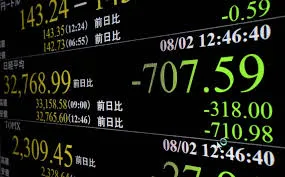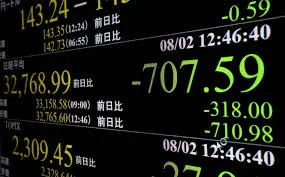Japanese Stocks Experience Sharpest Drop in 8 Years
Japanese Stocks Experience Sharpest Drop in 8 Years

Overview
Japanese stock markets have recently faced a significant downturn, with the Topix index recording its worst session since 2020. This decline is primarily attributed to the strengthening yen, which has raised concerns among investors about decreasing corporate profits.
Nikkei 225 Plummets
On August 2, the Nikkei 225 index fell dramatically by 5.8%, closing at 35,909 points. This represents the index’s steepest drop since March 2020, as reported by FactSet. Additionally, it is the first time since January that the Nikkei 225 has fallen below the 36,000-point mark.
Topix Index Takes a Hit
The Topix index saw an even more severe drop, declining by 6.14%. This marks its worst performance in eight years, closing at 2,537 points. Key stocks contributing to this decline include Daiwa Securities, which plummeted by 18.9%. Other major decliners included SoftBank, with an 8% drop, and trading companies Mitsui and Marubeni, which fell by 10% and 8% respectively.
Bond Yields and Currency Effects
Japan’s 10-year government bond yield also decreased, falling below 1%, the lowest level since mid-June. Analysts attribute this decline to the strengthening yen. A stronger yen can reduce corporate profits by making Japanese exports less competitive and decreasing earnings from overseas when converted back to yen.
Currency Intervention and Economic Impact
Since early July, the yen has been strengthening against the USD. This shift is partly due to intervention by Japanese authorities and a narrowing interest rate differential between Japan and the U.S. On July 31, the Bank of Japan (BOJ) increased its reference rate to around 0.25%, up from the previous 0-0.1% range. The BOJ has indicated that further rate hikes may follow if economic conditions align with expectations.
Meanwhile, the U.S. Federal Reserve (Fed) is anticipated to adjust interest rates in September. Recent data shows that U.S. consumers are starting to cut back on spending due to high interest rates and inflation.
Currently, one U.S. dollar exchanges for 148.9 yen, down from 161 yen per dollar in early July. Data from the Japanese Ministry of Finance indicates that in July, Japanese authorities spent 5.53 trillion yen (approximately $36.8 billion) to support the yen.
Broader Asian Market Impact
Other Asian markets also experienced declines. The Kospi index in South Korea fell by 3.6%, the Shanghai Composite in China dropped by 0.9%, and the Hang Seng Index in Hong Kong decreased by 2%. Additionally, stock markets in Singapore, Malaysia, Thailand, and Australia closed in the red.
Conclusion
The decline in Japanese stocks is a reflection of broader economic uncertainties and currency fluctuations. As global markets react to these changes, investors should stay informed about ongoing developments and potential impacts on their portfolios.
This article offers a clear overview of the current state of Japanese and Asian stock markets, highlighting key factors driving recent market movements.









Post Comment